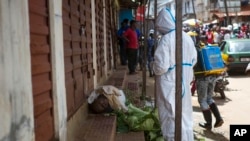Sierra Leone’s national army has teamed up with British medics and engineers to construct Ebola treatment centers across the country, especially in areas worst hit by the disease as part of a bid to combat the disease, according to Col. Michael Samura, spokesman for Sierra Leone’s military.
His comments followed President Ernest Bai Koroma’s plea for more international assistance to help the administration in Freetown combat the dreaded disease. Koroma expressed concern that the global response to Ebola has been slower than the infection rate.
The World Health Organization estimates that 3,865 people have so far died of the Ebola diseases.
Samura said the military has intensified patrolling border areas to ensure those infected with the disease are prevented from coming into the country.
“We still continue our operations along the border areas,” said Samura. “Treatment centers [have been] increased and in fact it is one of those treatment centers that has recently recorded the highest discharge of Ebola patients who have gotten healed.”
Samura said a lot of treatment centers were established following the recent three-day, nationwide shutdown in an effort to help contain the disease.
He said the country’s anti-Ebola effort received a boost following the arrival of a British team of engineers and medical officers.
“The British engineers and medics are in, and they are helping us with the construction of treatment centers across the country, particularly areas that are mostly affected with Ebola. Of course the U.N team is also expected to be in soon,” said Samura. “Our engineers are doing so well assisting the country with the construction of treatment centers all over the country where they are needed.
Some health experts are concerned that Sierra Leoneans residing in neighboring Liberia and Guinea, who may have been exposed to the disease, could return home and unwittingly infecting other citizens – thereby worsening the country’s infection rate.
Samura said Sierra Leone and neighboring countries are working closely to restrict cross-border movements.
“We are all working toward the same goal. So, definitely, as we are preventing people from going across into their country, they are also stopping their own people from coming across to us, because we don’t want people to be moving back and forth, and this is the way eventually, the virus is being spread here and there,” said Samura.





